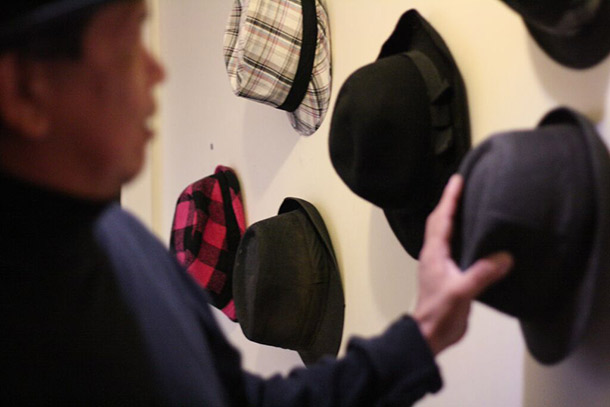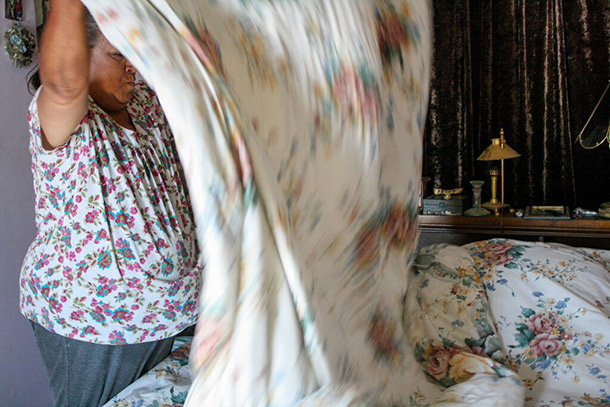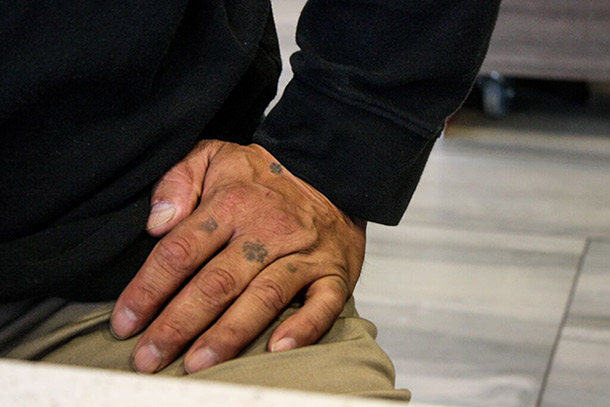[Editor’s note: This is part two of a Tyee series. Find the first part here.]
The day Dennis Bob shared his experience of residential school at the Truth and Reconciliation event in Vancouver remains a blur. He recounted the day to me when I visited his home in Burnaby a few years back.
Miniature Chinese New Year floats hung from the ceiling in the corner of his living room. He sat in an office chair a good six feet away from the couch that his girlfriend, Cynthia Keitlah, and I sat on. A few times he would begin to answer a question, then turn to Keitlah to finish for him. "Over to you, Cyndie."
He remembered crying a lot that day, and doesn't remember many other people's stories. Keitlah said that's because he left the room several times. But he is glad he shared his story. "I think the elders, the spirits were with me," he said. "Helping me, making me strong. It was excellent." Afterwards he met other people who attended Alberni Indian residential school, including the sister of his best friend at the time. At the end of it all, he took a bath and went to bed.
I asked Bob what he does now when he has a particularly difficult day or night. He'll watch a movie. "A funny movie probably," he said. Keitlah challenged him, gently. "When you have a rough day, which movie would you put on when you come home?" He was quiet. And then she answered. "He watches Apocalypto. It's really gory. Or The Deer Hunter. Natural Born Killers. He just has to get in there and get it out." Bob nodded. "Lots of guns," he said. He likes gangster movies -- Scarface, American Me or Blood In Blood Out. He likes true stories and said he misses his guns sometimes. "Maybe that's why," he said.
He excused himself and went to the bathroom -- something he explained earlier that he does when he's uncomfortable.
"He becomes a part of the movie," Keitlah said. "I think he plays a hero villain guy. He watches it and becomes a part of the movie." She'll ask him questions throughout -- is prison really like that? Do the guards really treat the inmates that horribly? Is that what a drive-by shooting looks like? He answers her questions patiently, retelling his own experiences. He misses the excitement of those times, but chooses to instead live vicariously through the fictional characters.
'Always there'
"The building is huge with long, white empty hallways. A child walks softly, the echo runs ahead of her. The smell of Lysol and floor wax overwhelms the memory of wood smoke and dirt floors," read the lines from a poem called "Residential School Bus" from Louise Bernice Halfe's book, Bear Bones & Feathers. The poem describes a scene reminiscent of the time Gina Laing spent a few days alone in Alberni Indian residential school.
She had been so afraid -- knowing her abuser would soon come for her because there was no one else to choose from. As we sat on the porch at her home in Hilthatis, she faced the ocean as she spoke. She feels safe now. Her husband prepared ham sandwiches inside for lunch. Erika, Laing's granddaughter, watched Into the Wild. Telling these stories is important to Laing. But the telling is painful. She closed her eyes, tilted her chin up towards the sun and began her story.
All the other kids had left for the summer and her parents were late picking her up. Huddling near the railing, she would look through to the dorm supervisor's room. When the curtains moved she'd know he was on his way up and she'd softly pad across the floor, down the back stairs to the linen closet at the end of a hallway that ran between the dormitories. Climbing into the back, over an edge where there was about a foot of space, she'd push past the cobwebs and squeeze into the small space. It was the best hiding spot. "Just me and the spiders," she laughed. "I'm scared to death of spiders. I used to feel like if they could tap their little feet and tell on me, they would."
The memory of the residential school is "always there. It's always on the edge of things." Though she said the memory is fainter than it once was. That she can sit on the porch and face the ocean is significant. She used to sit facing the door because that was where the danger came from. Laing was quiet and then straightened in her chair. "This stuff gets to you after a while," she said, excusing herself to go inside to watch the movie.
Practicing resurgence
Bob said he doesn't know much about his culture. Moving in and out of prison since he was a teenager, coupled with disagreements over land settlements, estranged him from his community. I asked him to tell me more about the cedar braid he wore around his head when he testified at the Truth and Reconciliation Commission. He's not sure about the traditional significance of cedar, but said, "Cyndie made it for me. I wear it because it represented the Native people. It made me feel good. It made me feel proud."
Jeff Corntassel, a Cherokee scholar and professor of indigenous governance, writes about the importance of "practicing every day acts of resurgence." In order to challenge systemic colonialism, he said, one must reclaim traditional practices. He maintains that "these daily acts of renewal, whether through prayer, speaking [traditional] language, honouring... ancestors, etc. are foundations of resurgence."
Keitlah teaches Bob the ways of her people -- the Ahousaht First Nation. She bought him a traditional drum and shows him how to burn sage. She also attended residential school. The two met at a treatment centre on the Tsow-Tun Le Lum reserve outside Nanaimo five years ago. "My heart was breaking into so many pieces," she said. "Dennis has helped me find them to get them back together."
Both were there for the eight-week trauma treatment program for survivors. The program required sobriety. It was the first time Bob had been sober in a long time. Keitlah remembers he'd walk up to tables snarling, causing people to move out of their seat for him. "People were scared of him." The turning moment arrived when he went on stage to participate in a psychodrama. The idea was to recreate an interaction between him and his abuser. But the drama only got as far as having an elderly man sit in a chair in front of him.
"I said you'd better move him. He's way too close. I'm gonna punch him," Bob recalled. They tried to explain that this was part of the therapy. But he wasn't persuaded. "I don't care, I'm gonna punch him." So the facilitators had another staff stand in, pretending to be Bob, while they continued to act out the hypothetical scene. As the scene progressed, "I started to cry and cry and cry," he said. "I'd never cried before. I wasn't allowed to cry in residential school, in jail. You didn't let them see your tears." This was the first time he faced what had happened to him.

He left the centre smiling that night. "Now I cry. And I'm happy. They put a smile on my face when I left." Today, it's difficult to imagine him not smiling. He is quick to make jokes, calling Keitlah "the warden," and wearing a T-shirt that says "Sofa king cool." Keitlah said he is the one in his family to bring up residential school. "When Dennis is around, he is the light for them. He's the light for me too."
His experience at residential school continues to affect his life. He doesn't like it when men get too close to him -- particularly elderly men. If he finds himself on a crowded bus and a man steps near him, he moves away and sometimes gets off to wait for the next bus.
Bob was only five when he was sexually abused. "A baby," said Keitlah. He has difficulty recalling what happened to him because many of his memories are fuzzy. Bob has become more accustomed to speaking about his experiences, but certain memories are difficult -- painful and also tough to recall because he repressed them for so long. "Something about lemon jam... " Bob sucked in and held his breath, releasing again stiltedly. "I can't remember. Something disgusting." He recalled his stomach hurting. And he'd been given an apple afterwards. Another kid asked for the core when he was finished. "Everybody was hungry there." He remembers "something about the basement" and "something about the house behind the school."
He left then and went to the bathroom again.
Corntassel writes that daily acts of resurgence are not glamorous. Sometimes they are messy. Sometimes they are angry. Often they are simple. Simply remembering what happened, or in Dennis's case trying to, contributes to healing. Corntassel differentiates between reconciliation and resurgence, saying that "processes of reconciliation are merely re-inscribing the status quo" while resurgence "takes the emphasis away from state frameworks of 'forgive and forget' back to re-localized, community-centred actions." Truth telling is central to this.
When Bob returned after several minutes, he was smiling. "The one thing I remember from [residential school] was my marbles. Because I lost them," he joked. He'd play marbles with the other kids in the courtyard. He'd draw a circle in the dirt, put a big marble in the middle and try to push it out of the circle by flicking the smaller marble towards it. Still today, whenever he sees marbles he has the urge to pocket them. Keitlah rolled her eyes and sighed. "You should have seen him when we first met. He'd bring home these pockets full of rocks and marbles. They'd be all piled up on the shelf." She thought for a moment. "What is with that? Why do you do that?"
He laughed and shrugged the question off, mumbling something about collecting them for her plants. Then he was quiet for a few seconds. "I guess it's because I never had nothing. So I want things." I thought back to the wall of hats near the entrance -- a cacophony of colourful, patterned fedoras hanging in neat lines.
Small tasks toward healing
Laing, who left residential school in 1964, hardly spoke until the late 1980s. Not only did she not talk about what happened to her at the Alberni Indian residential school, she could not even order a hamburger. The waitress would ask her what she wanted and she'd look down at her plate until her husband ordered for her. "I thought I would be ignored or laughed at," she said. When I asked Laing how the server responded the first time she ordered for herself, she laughed. "They got the burger and brought it to me."

On our last day in Hilthatis, I followed Laing into her room as she cleaned. She tossed the blanket to the side and then lifted the top sheet in the air. It parachuted and settled. At residential school she was required every day to make the bed just so. "We had to pull the sheets so tight that they could bounce a coin off of them," she said. If the coin didn't bounce she wasn't allowed to watch television on Sunday nights -- the one privilege. Once she left the school she stopped making the bed. For 50 years.
At that time, this silent rebellion had gone unnoticed even by her children. A few years ago, when her husband started complaining that the sheets were always getting twisted, she decided she was ready to revisit the old chore. Now Laing tucks the sheets in loosely and doesn't worry about smoothing out the wrinkles. She chuckles as she moves around the bed, recalling her long resistance. Mismatched pillows create a lopsided landscape. She makes the bed almost every day now, but she does so on her terms. ![]()
Read more: Indigenous, Rights + Justice

















Tyee Commenting Guidelines
Comments that violate guidelines risk being deleted, and violations may result in a temporary or permanent user ban. Maintain the spirit of good conversation to stay in the discussion.
*Please note The Tyee is not a forum for spreading misinformation about COVID-19, denying its existence or minimizing its risk to public health.
Do:
Do not: